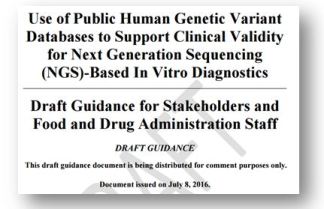FDA BRIEF: Week of July 4, 2016
FDA advances Precision Medicine Initiative by issuing draft guidances on next generation sequencing-based tests
In support of the President’s Precision Medicine
Two draft guidances for next generation sequencing (NGS)
- New technology to scan a person’s DNA to detect genomic variations for risk of disease
- Conventional diagnostics provide limited measure of disease/conditions
- NGS can examine millions of DNA variants at a time
Regulatory Perspective
- Encourage innovation while assuring NGS-based tests are accurate and useful
- Adherence will offer flexible and adaptive regulatory oversight
- Ensure Precision Care – is only as good as the tests that guide diagnosis and treatment
- Draft guidances important step in the development of NGS-based tests
- Encouraging public comments during the 90-day comment period.

Scope: Content and standards in providing oversight for whole exome human DNA sequencing (WES) or targeted human DNA sequencing NGS-based tests
Recommendations: Designing, developing, and validating NGS-based tests for germline diseases
Classification: Class II and potentially exempting them premarket notification; longer-term goal to establish special controls for 510(k)
Key Elements:
Test Design Considerations .
- Indications for Use Statement(s) of the Test
- Specific User Needs for the Test
- Specimen Type
- Interrogated Regions of the Genome
- Performance Needs
- Components and Methods
Test Performance Characteristics
- Accuracy
- Precision (Reproducibility and Repeatability) .
- Limit of Detection (LoD)
- Analytical Specificity
Test Run Quality Metrics
- Coverage (Read Depth and Completeness)
- Test Run Metrics and Performance Thresholds

Scope:
- Whether a genetic variant database could support NGS-based test validity in premarket submission
- Using curated databases using expert human interpretation for test developers to rely on clinical evidence from FDA-recognized public genome databases to support clinical claims
Recommendations: Recognition of Publicly Accessible Genetic Variant Databases
- Database Procedures and Operations .
- Data Quality
- Curation, Variant Interpretation and Assertions
- Professional Training and Conflicts of Interest
Process: Genetic Variant Database Recognition
- Submission for Recognition
- FDA Review
- Maintenance of FDA Recognition
- Use of Third Parties
- Use of Data and Assertions from Recognized Genetic Variant Databases